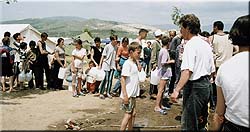When the Kosovo conflict erupted, I flew to the scene. I
believe the underlying basic strategy for crisis management is to gather
information at the scene and develop your contingency plan right there. The
Kosovo conflict has attracted much attention in Europe. They are intensely
involved in resolving this situation. In contrast, why is Japan be so aloof
to the conflict?
When it comes to business, the Japanese travel all around the
world. But when there are risks involved, we do not see any Japanese. As a
result, we are perceived as a selfish people. If this situation continues,
if our security were to be threatened, would any country be willing to
really help us? When there are problems in a certain area, Japan handles
the situation according to its own foreign policy. But if we help others
in our own way, when we are facing danger, others will help us. This is
what I believe to be the basic concept of a security policy which directly
relates to crisis management by a state.
During the its own economic crisis, the Japanese government
assisted the Kosovo refugees by providing financial assistance. However,
this was barely known in the West, due to a lack of coverage by the Western
media such as CNN and the BBC. The media covered issues such as why NATO
(North Atlantic Treaty Organization) commenced bombing on the region and why
the U.S. participated in the military action. We never saw any Japanese.
I visited the Stankovoz camp, which was operated by the British military.
The Union Jack was flying over the camp. There was also a Union Jack on
every tent that was set up in the camp. Although most of the funding for
materials and supplies was provided by Japan, the media only covered scenes
of British army trucks arriving with food. Under the present
circumstances, we never see the faces of the Japanese participating in
foreign aid policy. We do not need to advertise 'we are helping!' but it
would be preferable if we could have seen s!
ome physical Japanese presence in the disaster areas.
Consequently, it is important for future aid to be undertaken in
terms of both manpower and financial assistance. Although refugee camps are
operated by the United Nations High Commission for Refugees, the actual
operations are conducted by non-governmental organizations, (NGOs), but
still, during the Kosovo conflict, we did saw no see Japanese. It is not
easy for NGOs to participate in rescue missions in areas of conflict. NGOs
from other countries have had experience in past rescue missions such as
those in Afghanistan and Cambodia. In comparison, Japanese NGOs lack
sufficient experience to operate in areas of conflict. Instead of
assisting, they might act as a dead weight to the whole mission since they
would need guidance from day one. Hereafter, the central government to play
a role in assisting Japanese NGOs to contribute to future rescue missions.
Under the existing system, it is very difficult.
NGOs actively participate in rescue missions abroad. I
have been advocating the need for the Japanese government to provide more
assistance to NGOs, in places such as the LDP assembly. It is possible for
NGOs to operate on contributions. Nonetheless, in looking at other
countries, there is considerable support for labor costs of their main
offices from their governments. It would be necessary to create conditions
in Japan which would support NGOs. Eventually, this would have a positive
impact on our security.
Additionally, we have fire departments all over Japan. I believe
that we could create a overseas voluntary aid organization based on these
departments. Fire departments were originally organized on the basis of
volunteer spirit, to help out in the community. We could develop a system
in which each fire department would take a turn assisting in an overseas aid
project. Currently, there are no existing institutions comparable to fire
departments. It is rare to find an organization which has already
substantial trained manpower ready to be dispatched at anytime. It would be
a waste if we do not use a resource of which we are so proud.
|

